Autonomy in Healthcare: Ethical Theories and Professional Practice
VerifiedAdded on 2022/07/28
|16
|4548
|41
Essay
AI Summary
This essay critically examines the principle of autonomy in healthcare, tracing its evolution and significance in healthcare ethics. It defines autonomy as self-ownership and self-determination, emphasizing its central role alongside other ethical principles like beneficence, non-maleficence, and confidentiality. The essay discusses the importance of patient autonomy in decision-making, especially concerning medical interventions, and addresses obstacles that can affect patient decision-making capabilities. It explores how autonomy shapes informed consent and patient rights, highlighting the need for healthcare providers to respect patient choices, even when those choices seem contrary to their well-being, within the bounds of patient competence. Furthermore, the essay discusses the relationship between autonomy and informed consent, emphasizing that informed consent is based on the principle of autonomy since the patient has to respected as being autonomous while providing informed consent. The essay also highlights the significance of respecting autonomy in healthcare, especially in the context of legal requirements and the patient’s right to refuse treatment. It also addresses the limitations of autonomy in cases of patient incapacitation, and the importance of healthcare professionals acting in the patient's best interest in such scenarios. The essay uses examples from professional practice to illustrate the arguments, incorporating relevant ethical theories, and emphasizes the need for healthcare providers to provide adequate information to patients, ensuring that patients are fully informed about their treatment options. This essay provides a comprehensive overview of autonomy as a central ethical principle in healthcare, supported by professional practice examples.
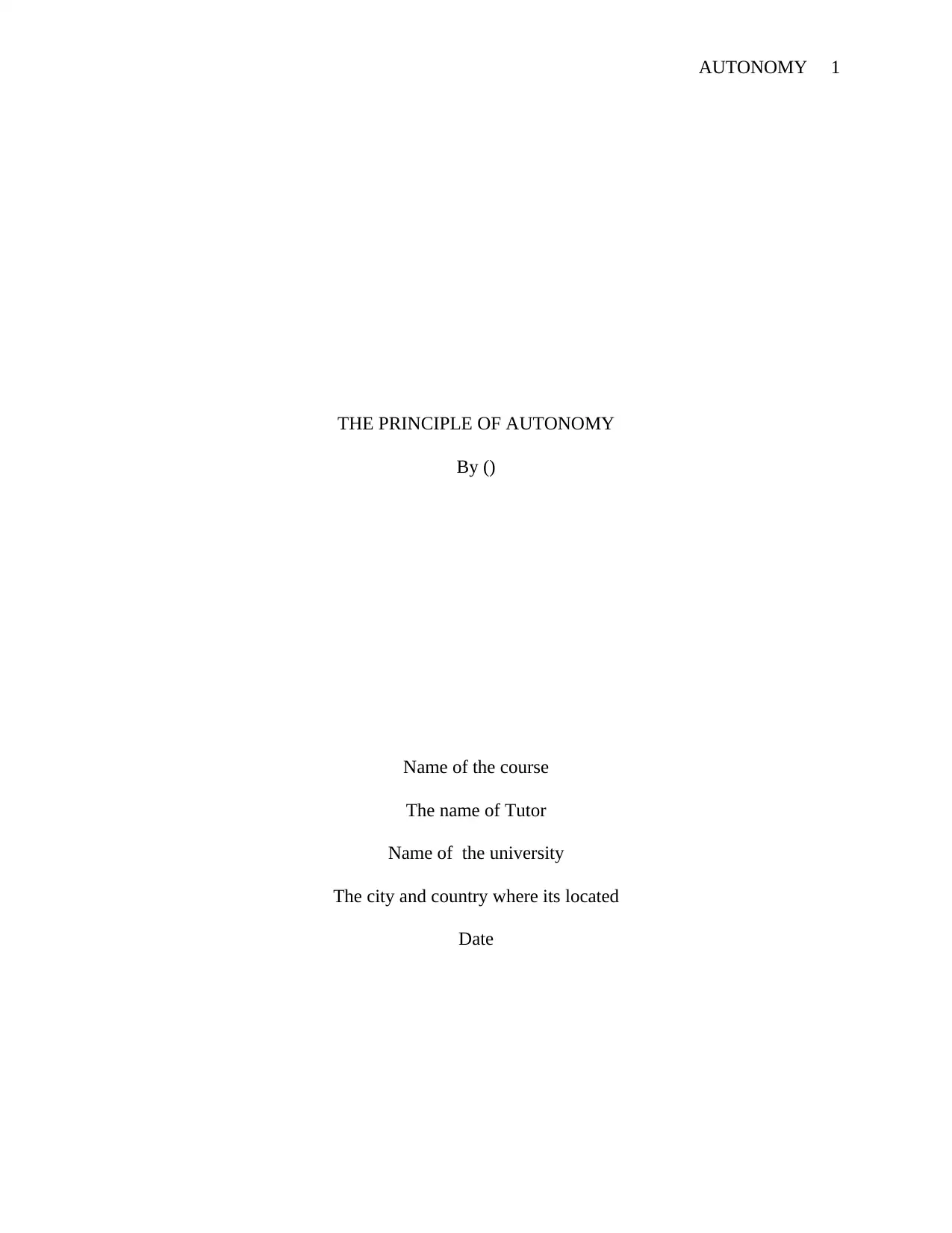
AUTONOMY 1
THE PRINCIPLE OF AUTONOMY
By ()
Name of the course
The name of Tutor
Name of the university
The city and country where its located
Date
THE PRINCIPLE OF AUTONOMY
By ()
Name of the course
The name of Tutor
Name of the university
The city and country where its located
Date
Paraphrase This Document
Need a fresh take? Get an instant paraphrase of this document with our AI Paraphraser
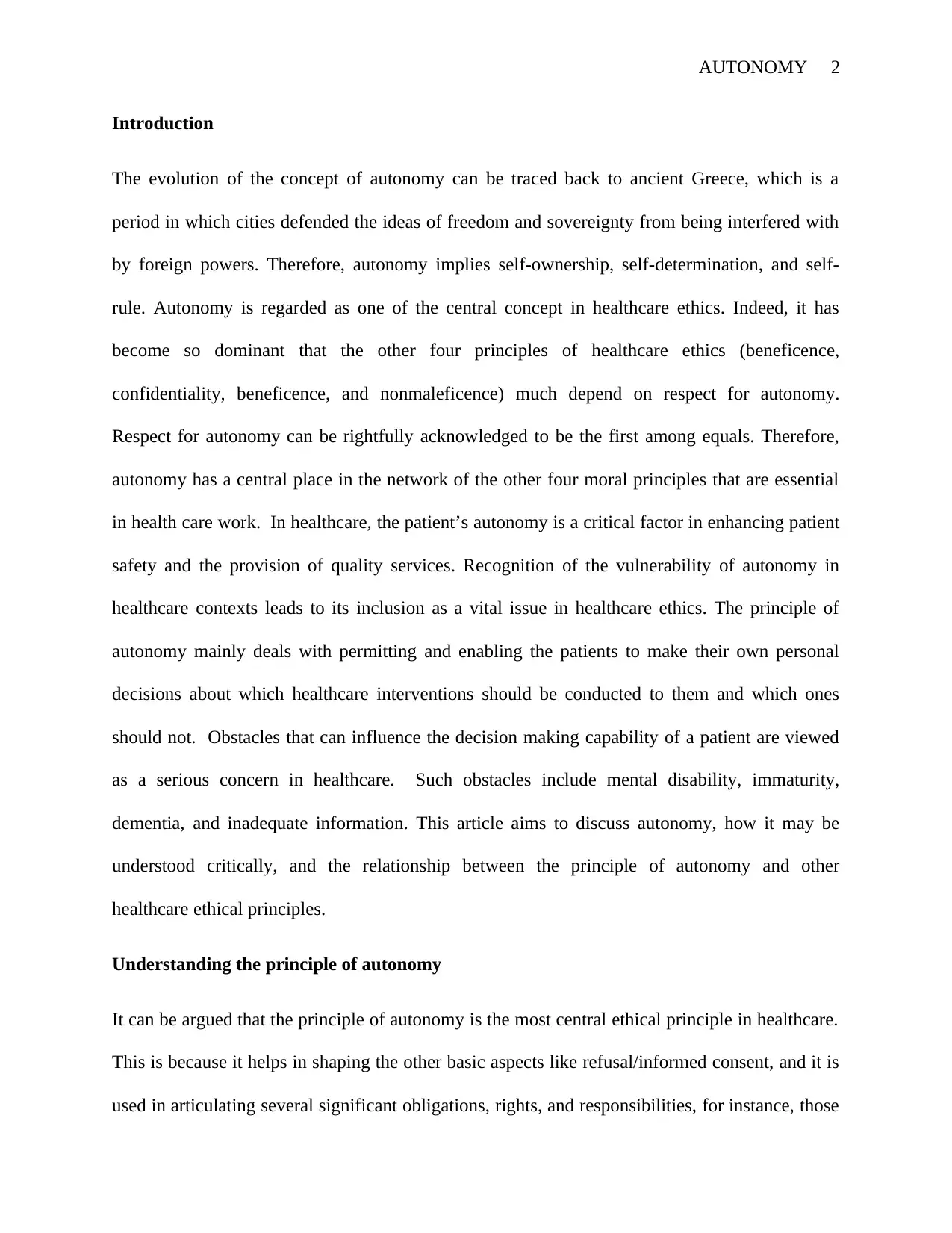
AUTONOMY 2
Introduction
The evolution of the concept of autonomy can be traced back to ancient Greece, which is a
period in which cities defended the ideas of freedom and sovereignty from being interfered with
by foreign powers. Therefore, autonomy implies self-ownership, self-determination, and self-
rule. Autonomy is regarded as one of the central concept in healthcare ethics. Indeed, it has
become so dominant that the other four principles of healthcare ethics (beneficence,
confidentiality, beneficence, and nonmaleficence) much depend on respect for autonomy.
Respect for autonomy can be rightfully acknowledged to be the first among equals. Therefore,
autonomy has a central place in the network of the other four moral principles that are essential
in health care work. In healthcare, the patient’s autonomy is a critical factor in enhancing patient
safety and the provision of quality services. Recognition of the vulnerability of autonomy in
healthcare contexts leads to its inclusion as a vital issue in healthcare ethics. The principle of
autonomy mainly deals with permitting and enabling the patients to make their own personal
decisions about which healthcare interventions should be conducted to them and which ones
should not. Obstacles that can influence the decision making capability of a patient are viewed
as a serious concern in healthcare. Such obstacles include mental disability, immaturity,
dementia, and inadequate information. This article aims to discuss autonomy, how it may be
understood critically, and the relationship between the principle of autonomy and other
healthcare ethical principles.
Understanding the principle of autonomy
It can be argued that the principle of autonomy is the most central ethical principle in healthcare.
This is because it helps in shaping the other basic aspects like refusal/informed consent, and it is
used in articulating several significant obligations, rights, and responsibilities, for instance, those
Introduction
The evolution of the concept of autonomy can be traced back to ancient Greece, which is a
period in which cities defended the ideas of freedom and sovereignty from being interfered with
by foreign powers. Therefore, autonomy implies self-ownership, self-determination, and self-
rule. Autonomy is regarded as one of the central concept in healthcare ethics. Indeed, it has
become so dominant that the other four principles of healthcare ethics (beneficence,
confidentiality, beneficence, and nonmaleficence) much depend on respect for autonomy.
Respect for autonomy can be rightfully acknowledged to be the first among equals. Therefore,
autonomy has a central place in the network of the other four moral principles that are essential
in health care work. In healthcare, the patient’s autonomy is a critical factor in enhancing patient
safety and the provision of quality services. Recognition of the vulnerability of autonomy in
healthcare contexts leads to its inclusion as a vital issue in healthcare ethics. The principle of
autonomy mainly deals with permitting and enabling the patients to make their own personal
decisions about which healthcare interventions should be conducted to them and which ones
should not. Obstacles that can influence the decision making capability of a patient are viewed
as a serious concern in healthcare. Such obstacles include mental disability, immaturity,
dementia, and inadequate information. This article aims to discuss autonomy, how it may be
understood critically, and the relationship between the principle of autonomy and other
healthcare ethical principles.
Understanding the principle of autonomy
It can be argued that the principle of autonomy is the most central ethical principle in healthcare.
This is because it helps in shaping the other basic aspects like refusal/informed consent, and it is
used in articulating several significant obligations, rights, and responsibilities, for instance, those
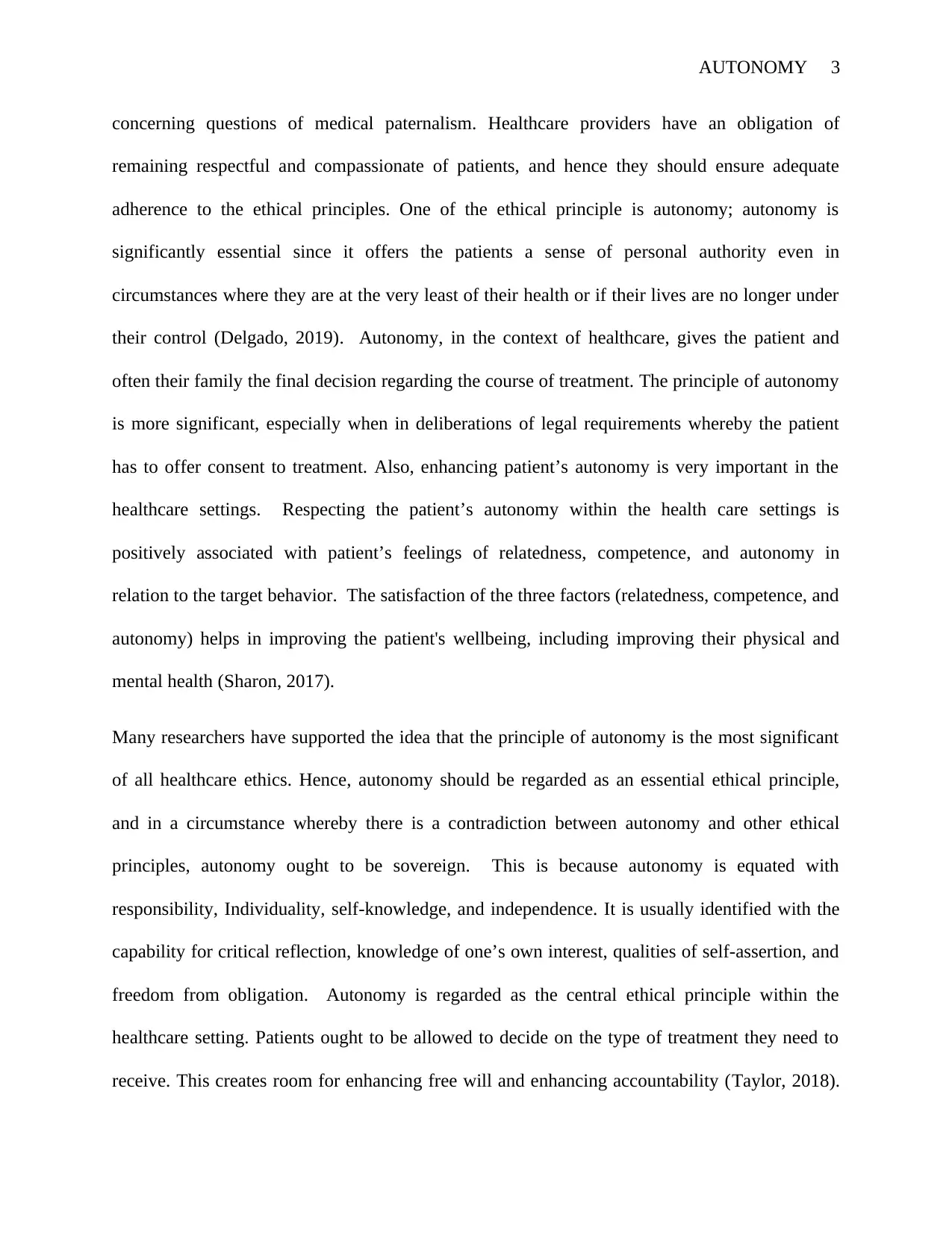
AUTONOMY 3
concerning questions of medical paternalism. Healthcare providers have an obligation of
remaining respectful and compassionate of patients, and hence they should ensure adequate
adherence to the ethical principles. One of the ethical principle is autonomy; autonomy is
significantly essential since it offers the patients a sense of personal authority even in
circumstances where they are at the very least of their health or if their lives are no longer under
their control (Delgado, 2019). Autonomy, in the context of healthcare, gives the patient and
often their family the final decision regarding the course of treatment. The principle of autonomy
is more significant, especially when in deliberations of legal requirements whereby the patient
has to offer consent to treatment. Also, enhancing patient’s autonomy is very important in the
healthcare settings. Respecting the patient’s autonomy within the health care settings is
positively associated with patient’s feelings of relatedness, competence, and autonomy in
relation to the target behavior. The satisfaction of the three factors (relatedness, competence, and
autonomy) helps in improving the patient's wellbeing, including improving their physical and
mental health (Sharon, 2017).
Many researchers have supported the idea that the principle of autonomy is the most significant
of all healthcare ethics. Hence, autonomy should be regarded as an essential ethical principle,
and in a circumstance whereby there is a contradiction between autonomy and other ethical
principles, autonomy ought to be sovereign. This is because autonomy is equated with
responsibility, Individuality, self-knowledge, and independence. It is usually identified with the
capability for critical reflection, knowledge of one’s own interest, qualities of self-assertion, and
freedom from obligation. Autonomy is regarded as the central ethical principle within the
healthcare setting. Patients ought to be allowed to decide on the type of treatment they need to
receive. This creates room for enhancing free will and enhancing accountability (Taylor, 2018).
concerning questions of medical paternalism. Healthcare providers have an obligation of
remaining respectful and compassionate of patients, and hence they should ensure adequate
adherence to the ethical principles. One of the ethical principle is autonomy; autonomy is
significantly essential since it offers the patients a sense of personal authority even in
circumstances where they are at the very least of their health or if their lives are no longer under
their control (Delgado, 2019). Autonomy, in the context of healthcare, gives the patient and
often their family the final decision regarding the course of treatment. The principle of autonomy
is more significant, especially when in deliberations of legal requirements whereby the patient
has to offer consent to treatment. Also, enhancing patient’s autonomy is very important in the
healthcare settings. Respecting the patient’s autonomy within the health care settings is
positively associated with patient’s feelings of relatedness, competence, and autonomy in
relation to the target behavior. The satisfaction of the three factors (relatedness, competence, and
autonomy) helps in improving the patient's wellbeing, including improving their physical and
mental health (Sharon, 2017).
Many researchers have supported the idea that the principle of autonomy is the most significant
of all healthcare ethics. Hence, autonomy should be regarded as an essential ethical principle,
and in a circumstance whereby there is a contradiction between autonomy and other ethical
principles, autonomy ought to be sovereign. This is because autonomy is equated with
responsibility, Individuality, self-knowledge, and independence. It is usually identified with the
capability for critical reflection, knowledge of one’s own interest, qualities of self-assertion, and
freedom from obligation. Autonomy is regarded as the central ethical principle within the
healthcare setting. Patients ought to be allowed to decide on the type of treatment they need to
receive. This creates room for enhancing free will and enhancing accountability (Taylor, 2018).
⊘ This is a preview!⊘
Do you want full access?
Subscribe today to unlock all pages.

Trusted by 1+ million students worldwide
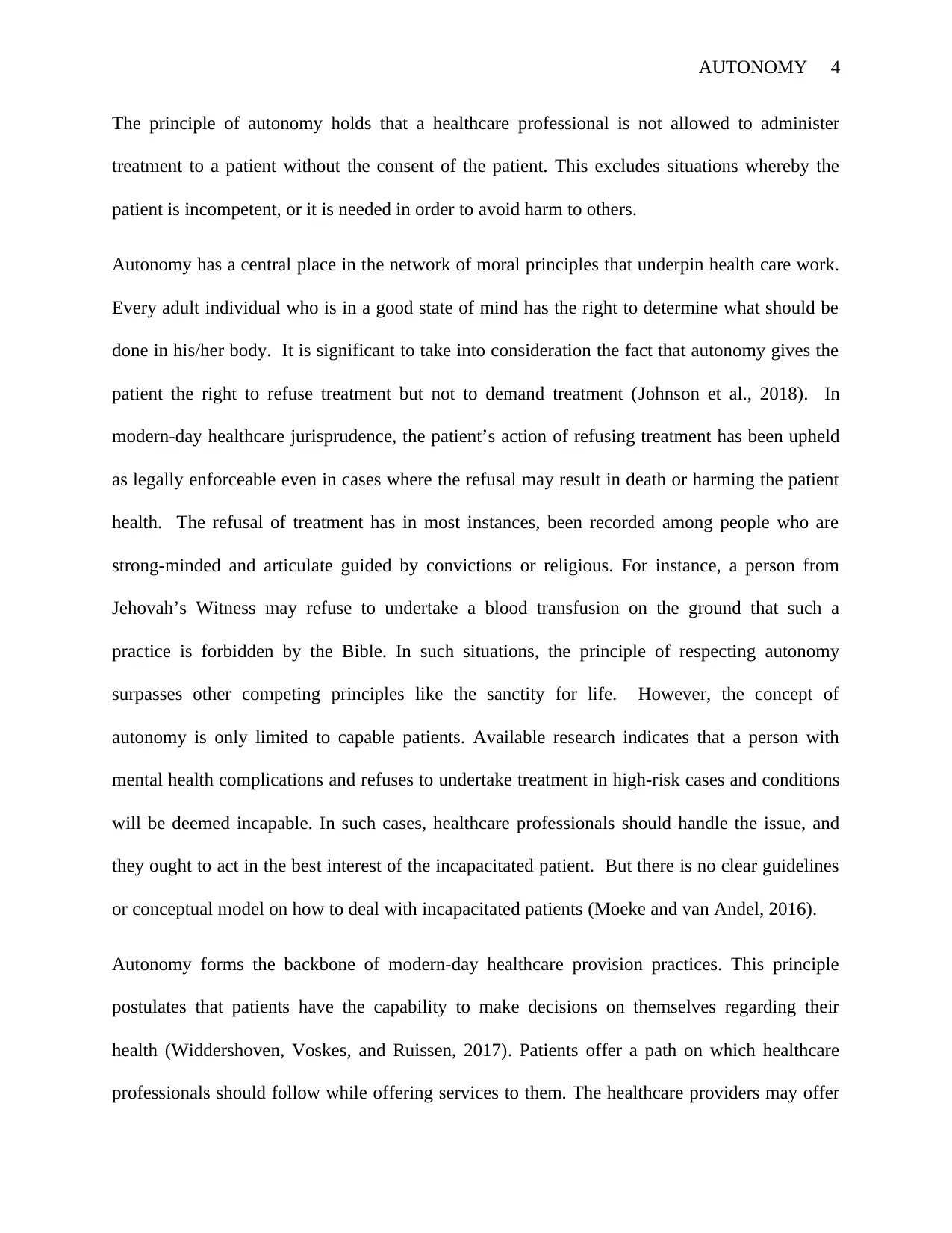
AUTONOMY 4
The principle of autonomy holds that a healthcare professional is not allowed to administer
treatment to a patient without the consent of the patient. This excludes situations whereby the
patient is incompetent, or it is needed in order to avoid harm to others.
Autonomy has a central place in the network of moral principles that underpin health care work.
Every adult individual who is in a good state of mind has the right to determine what should be
done in his/her body. It is significant to take into consideration the fact that autonomy gives the
patient the right to refuse treatment but not to demand treatment (Johnson et al., 2018). In
modern-day healthcare jurisprudence, the patient’s action of refusing treatment has been upheld
as legally enforceable even in cases where the refusal may result in death or harming the patient
health. The refusal of treatment has in most instances, been recorded among people who are
strong-minded and articulate guided by convictions or religious. For instance, a person from
Jehovah’s Witness may refuse to undertake a blood transfusion on the ground that such a
practice is forbidden by the Bible. In such situations, the principle of respecting autonomy
surpasses other competing principles like the sanctity for life. However, the concept of
autonomy is only limited to capable patients. Available research indicates that a person with
mental health complications and refuses to undertake treatment in high-risk cases and conditions
will be deemed incapable. In such cases, healthcare professionals should handle the issue, and
they ought to act in the best interest of the incapacitated patient. But there is no clear guidelines
or conceptual model on how to deal with incapacitated patients (Moeke and van Andel, 2016).
Autonomy forms the backbone of modern-day healthcare provision practices. This principle
postulates that patients have the capability to make decisions on themselves regarding their
health (Widdershoven, Voskes, and Ruissen, 2017). Patients offer a path on which healthcare
professionals should follow while offering services to them. The healthcare providers may offer
The principle of autonomy holds that a healthcare professional is not allowed to administer
treatment to a patient without the consent of the patient. This excludes situations whereby the
patient is incompetent, or it is needed in order to avoid harm to others.
Autonomy has a central place in the network of moral principles that underpin health care work.
Every adult individual who is in a good state of mind has the right to determine what should be
done in his/her body. It is significant to take into consideration the fact that autonomy gives the
patient the right to refuse treatment but not to demand treatment (Johnson et al., 2018). In
modern-day healthcare jurisprudence, the patient’s action of refusing treatment has been upheld
as legally enforceable even in cases where the refusal may result in death or harming the patient
health. The refusal of treatment has in most instances, been recorded among people who are
strong-minded and articulate guided by convictions or religious. For instance, a person from
Jehovah’s Witness may refuse to undertake a blood transfusion on the ground that such a
practice is forbidden by the Bible. In such situations, the principle of respecting autonomy
surpasses other competing principles like the sanctity for life. However, the concept of
autonomy is only limited to capable patients. Available research indicates that a person with
mental health complications and refuses to undertake treatment in high-risk cases and conditions
will be deemed incapable. In such cases, healthcare professionals should handle the issue, and
they ought to act in the best interest of the incapacitated patient. But there is no clear guidelines
or conceptual model on how to deal with incapacitated patients (Moeke and van Andel, 2016).
Autonomy forms the backbone of modern-day healthcare provision practices. This principle
postulates that patients have the capability to make decisions on themselves regarding their
health (Widdershoven, Voskes, and Ruissen, 2017). Patients offer a path on which healthcare
professionals should follow while offering services to them. The healthcare providers may offer
Paraphrase This Document
Need a fresh take? Get an instant paraphrase of this document with our AI Paraphraser
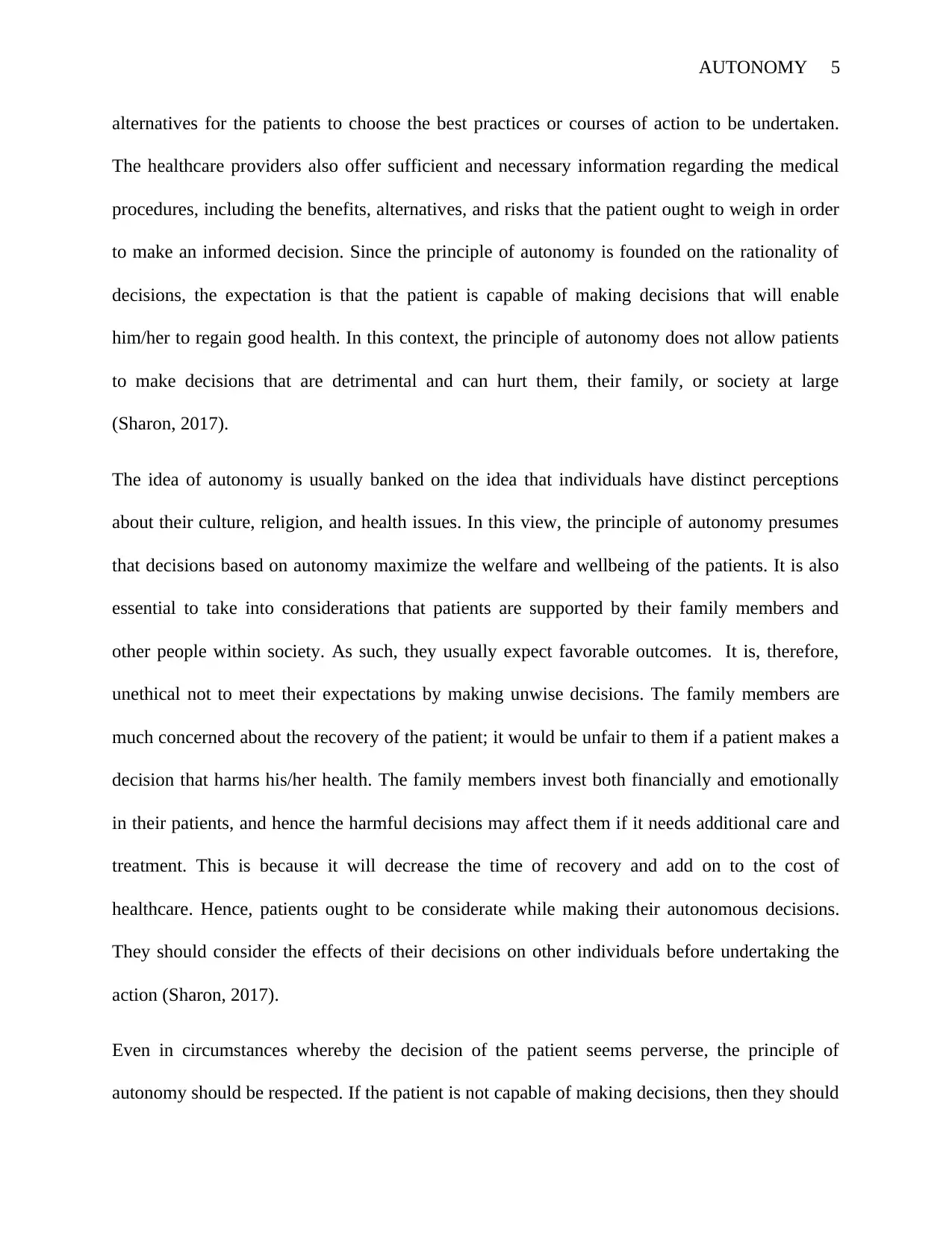
AUTONOMY 5
alternatives for the patients to choose the best practices or courses of action to be undertaken.
The healthcare providers also offer sufficient and necessary information regarding the medical
procedures, including the benefits, alternatives, and risks that the patient ought to weigh in order
to make an informed decision. Since the principle of autonomy is founded on the rationality of
decisions, the expectation is that the patient is capable of making decisions that will enable
him/her to regain good health. In this context, the principle of autonomy does not allow patients
to make decisions that are detrimental and can hurt them, their family, or society at large
(Sharon, 2017).
The idea of autonomy is usually banked on the idea that individuals have distinct perceptions
about their culture, religion, and health issues. In this view, the principle of autonomy presumes
that decisions based on autonomy maximize the welfare and wellbeing of the patients. It is also
essential to take into considerations that patients are supported by their family members and
other people within society. As such, they usually expect favorable outcomes. It is, therefore,
unethical not to meet their expectations by making unwise decisions. The family members are
much concerned about the recovery of the patient; it would be unfair to them if a patient makes a
decision that harms his/her health. The family members invest both financially and emotionally
in their patients, and hence the harmful decisions may affect them if it needs additional care and
treatment. This is because it will decrease the time of recovery and add on to the cost of
healthcare. Hence, patients ought to be considerate while making their autonomous decisions.
They should consider the effects of their decisions on other individuals before undertaking the
action (Sharon, 2017).
Even in circumstances whereby the decision of the patient seems perverse, the principle of
autonomy should be respected. If the patient is not capable of making decisions, then they should
alternatives for the patients to choose the best practices or courses of action to be undertaken.
The healthcare providers also offer sufficient and necessary information regarding the medical
procedures, including the benefits, alternatives, and risks that the patient ought to weigh in order
to make an informed decision. Since the principle of autonomy is founded on the rationality of
decisions, the expectation is that the patient is capable of making decisions that will enable
him/her to regain good health. In this context, the principle of autonomy does not allow patients
to make decisions that are detrimental and can hurt them, their family, or society at large
(Sharon, 2017).
The idea of autonomy is usually banked on the idea that individuals have distinct perceptions
about their culture, religion, and health issues. In this view, the principle of autonomy presumes
that decisions based on autonomy maximize the welfare and wellbeing of the patients. It is also
essential to take into considerations that patients are supported by their family members and
other people within society. As such, they usually expect favorable outcomes. It is, therefore,
unethical not to meet their expectations by making unwise decisions. The family members are
much concerned about the recovery of the patient; it would be unfair to them if a patient makes a
decision that harms his/her health. The family members invest both financially and emotionally
in their patients, and hence the harmful decisions may affect them if it needs additional care and
treatment. This is because it will decrease the time of recovery and add on to the cost of
healthcare. Hence, patients ought to be considerate while making their autonomous decisions.
They should consider the effects of their decisions on other individuals before undertaking the
action (Sharon, 2017).
Even in circumstances whereby the decision of the patient seems perverse, the principle of
autonomy should be respected. If the patient is not capable of making decisions, then they should
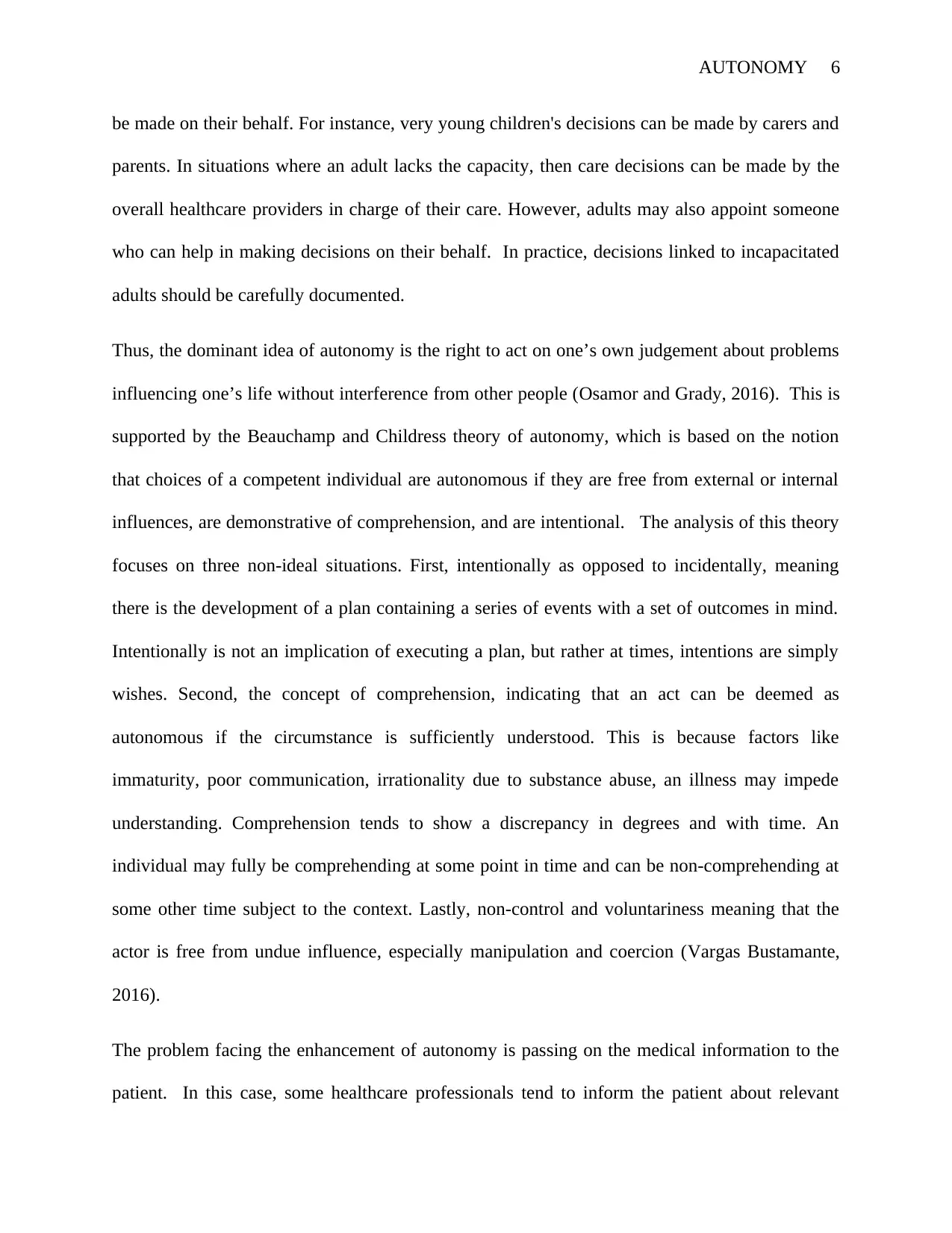
AUTONOMY 6
be made on their behalf. For instance, very young children's decisions can be made by carers and
parents. In situations where an adult lacks the capacity, then care decisions can be made by the
overall healthcare providers in charge of their care. However, adults may also appoint someone
who can help in making decisions on their behalf. In practice, decisions linked to incapacitated
adults should be carefully documented.
Thus, the dominant idea of autonomy is the right to act on one’s own judgement about problems
influencing one’s life without interference from other people (Osamor and Grady, 2016). This is
supported by the Beauchamp and Childress theory of autonomy, which is based on the notion
that choices of a competent individual are autonomous if they are free from external or internal
influences, are demonstrative of comprehension, and are intentional. The analysis of this theory
focuses on three non-ideal situations. First, intentionally as opposed to incidentally, meaning
there is the development of a plan containing a series of events with a set of outcomes in mind.
Intentionally is not an implication of executing a plan, but rather at times, intentions are simply
wishes. Second, the concept of comprehension, indicating that an act can be deemed as
autonomous if the circumstance is sufficiently understood. This is because factors like
immaturity, poor communication, irrationality due to substance abuse, an illness may impede
understanding. Comprehension tends to show a discrepancy in degrees and with time. An
individual may fully be comprehending at some point in time and can be non-comprehending at
some other time subject to the context. Lastly, non-control and voluntariness meaning that the
actor is free from undue influence, especially manipulation and coercion (Vargas Bustamante,
2016).
The problem facing the enhancement of autonomy is passing on the medical information to the
patient. In this case, some healthcare professionals tend to inform the patient about relevant
be made on their behalf. For instance, very young children's decisions can be made by carers and
parents. In situations where an adult lacks the capacity, then care decisions can be made by the
overall healthcare providers in charge of their care. However, adults may also appoint someone
who can help in making decisions on their behalf. In practice, decisions linked to incapacitated
adults should be carefully documented.
Thus, the dominant idea of autonomy is the right to act on one’s own judgement about problems
influencing one’s life without interference from other people (Osamor and Grady, 2016). This is
supported by the Beauchamp and Childress theory of autonomy, which is based on the notion
that choices of a competent individual are autonomous if they are free from external or internal
influences, are demonstrative of comprehension, and are intentional. The analysis of this theory
focuses on three non-ideal situations. First, intentionally as opposed to incidentally, meaning
there is the development of a plan containing a series of events with a set of outcomes in mind.
Intentionally is not an implication of executing a plan, but rather at times, intentions are simply
wishes. Second, the concept of comprehension, indicating that an act can be deemed as
autonomous if the circumstance is sufficiently understood. This is because factors like
immaturity, poor communication, irrationality due to substance abuse, an illness may impede
understanding. Comprehension tends to show a discrepancy in degrees and with time. An
individual may fully be comprehending at some point in time and can be non-comprehending at
some other time subject to the context. Lastly, non-control and voluntariness meaning that the
actor is free from undue influence, especially manipulation and coercion (Vargas Bustamante,
2016).
The problem facing the enhancement of autonomy is passing on the medical information to the
patient. In this case, some healthcare professionals tend to inform the patient about relevant
⊘ This is a preview!⊘
Do you want full access?
Subscribe today to unlock all pages.

Trusted by 1+ million students worldwide
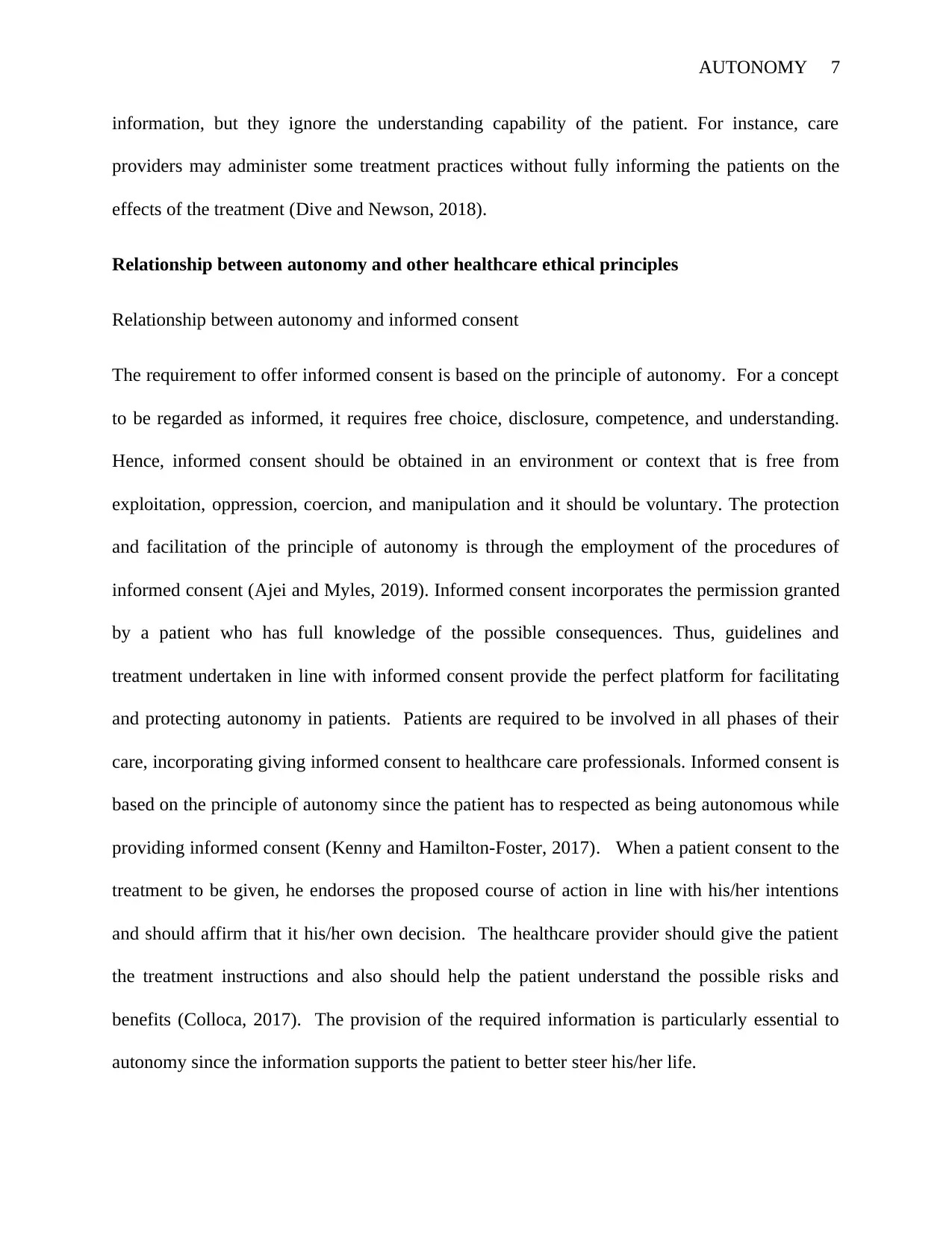
AUTONOMY 7
information, but they ignore the understanding capability of the patient. For instance, care
providers may administer some treatment practices without fully informing the patients on the
effects of the treatment (Dive and Newson, 2018).
Relationship between autonomy and other healthcare ethical principles
Relationship between autonomy and informed consent
The requirement to offer informed consent is based on the principle of autonomy. For a concept
to be regarded as informed, it requires free choice, disclosure, competence, and understanding.
Hence, informed consent should be obtained in an environment or context that is free from
exploitation, oppression, coercion, and manipulation and it should be voluntary. The protection
and facilitation of the principle of autonomy is through the employment of the procedures of
informed consent (Ajei and Myles, 2019). Informed consent incorporates the permission granted
by a patient who has full knowledge of the possible consequences. Thus, guidelines and
treatment undertaken in line with informed consent provide the perfect platform for facilitating
and protecting autonomy in patients. Patients are required to be involved in all phases of their
care, incorporating giving informed consent to healthcare care professionals. Informed consent is
based on the principle of autonomy since the patient has to respected as being autonomous while
providing informed consent (Kenny and Hamilton-Foster, 2017). When a patient consent to the
treatment to be given, he endorses the proposed course of action in line with his/her intentions
and should affirm that it his/her own decision. The healthcare provider should give the patient
the treatment instructions and also should help the patient understand the possible risks and
benefits (Colloca, 2017). The provision of the required information is particularly essential to
autonomy since the information supports the patient to better steer his/her life.
information, but they ignore the understanding capability of the patient. For instance, care
providers may administer some treatment practices without fully informing the patients on the
effects of the treatment (Dive and Newson, 2018).
Relationship between autonomy and other healthcare ethical principles
Relationship between autonomy and informed consent
The requirement to offer informed consent is based on the principle of autonomy. For a concept
to be regarded as informed, it requires free choice, disclosure, competence, and understanding.
Hence, informed consent should be obtained in an environment or context that is free from
exploitation, oppression, coercion, and manipulation and it should be voluntary. The protection
and facilitation of the principle of autonomy is through the employment of the procedures of
informed consent (Ajei and Myles, 2019). Informed consent incorporates the permission granted
by a patient who has full knowledge of the possible consequences. Thus, guidelines and
treatment undertaken in line with informed consent provide the perfect platform for facilitating
and protecting autonomy in patients. Patients are required to be involved in all phases of their
care, incorporating giving informed consent to healthcare care professionals. Informed consent is
based on the principle of autonomy since the patient has to respected as being autonomous while
providing informed consent (Kenny and Hamilton-Foster, 2017). When a patient consent to the
treatment to be given, he endorses the proposed course of action in line with his/her intentions
and should affirm that it his/her own decision. The healthcare provider should give the patient
the treatment instructions and also should help the patient understand the possible risks and
benefits (Colloca, 2017). The provision of the required information is particularly essential to
autonomy since the information supports the patient to better steer his/her life.
Paraphrase This Document
Need a fresh take? Get an instant paraphrase of this document with our AI Paraphraser
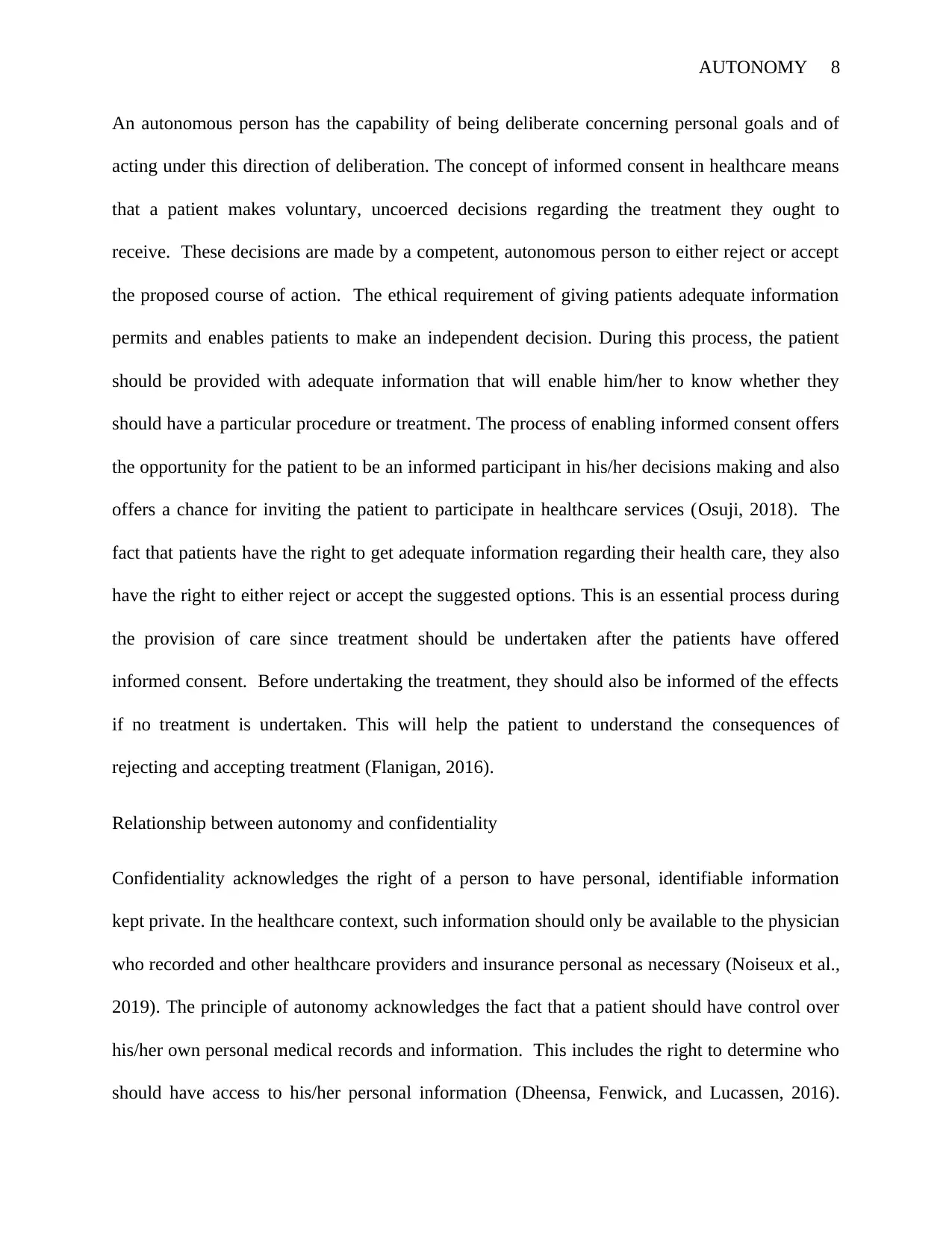
AUTONOMY 8
An autonomous person has the capability of being deliberate concerning personal goals and of
acting under this direction of deliberation. The concept of informed consent in healthcare means
that a patient makes voluntary, uncoerced decisions regarding the treatment they ought to
receive. These decisions are made by a competent, autonomous person to either reject or accept
the proposed course of action. The ethical requirement of giving patients adequate information
permits and enables patients to make an independent decision. During this process, the patient
should be provided with adequate information that will enable him/her to know whether they
should have a particular procedure or treatment. The process of enabling informed consent offers
the opportunity for the patient to be an informed participant in his/her decisions making and also
offers a chance for inviting the patient to participate in healthcare services (Osuji, 2018). The
fact that patients have the right to get adequate information regarding their health care, they also
have the right to either reject or accept the suggested options. This is an essential process during
the provision of care since treatment should be undertaken after the patients have offered
informed consent. Before undertaking the treatment, they should also be informed of the effects
if no treatment is undertaken. This will help the patient to understand the consequences of
rejecting and accepting treatment (Flanigan, 2016).
Relationship between autonomy and confidentiality
Confidentiality acknowledges the right of a person to have personal, identifiable information
kept private. In the healthcare context, such information should only be available to the physician
who recorded and other healthcare providers and insurance personal as necessary (Noiseux et al.,
2019). The principle of autonomy acknowledges the fact that a patient should have control over
his/her own personal medical records and information. This includes the right to determine who
should have access to his/her personal information (Dheensa, Fenwick, and Lucassen, 2016).
An autonomous person has the capability of being deliberate concerning personal goals and of
acting under this direction of deliberation. The concept of informed consent in healthcare means
that a patient makes voluntary, uncoerced decisions regarding the treatment they ought to
receive. These decisions are made by a competent, autonomous person to either reject or accept
the proposed course of action. The ethical requirement of giving patients adequate information
permits and enables patients to make an independent decision. During this process, the patient
should be provided with adequate information that will enable him/her to know whether they
should have a particular procedure or treatment. The process of enabling informed consent offers
the opportunity for the patient to be an informed participant in his/her decisions making and also
offers a chance for inviting the patient to participate in healthcare services (Osuji, 2018). The
fact that patients have the right to get adequate information regarding their health care, they also
have the right to either reject or accept the suggested options. This is an essential process during
the provision of care since treatment should be undertaken after the patients have offered
informed consent. Before undertaking the treatment, they should also be informed of the effects
if no treatment is undertaken. This will help the patient to understand the consequences of
rejecting and accepting treatment (Flanigan, 2016).
Relationship between autonomy and confidentiality
Confidentiality acknowledges the right of a person to have personal, identifiable information
kept private. In the healthcare context, such information should only be available to the physician
who recorded and other healthcare providers and insurance personal as necessary (Noiseux et al.,
2019). The principle of autonomy acknowledges the fact that a patient should have control over
his/her own personal medical records and information. This includes the right to determine who
should have access to his/her personal information (Dheensa, Fenwick, and Lucassen, 2016).
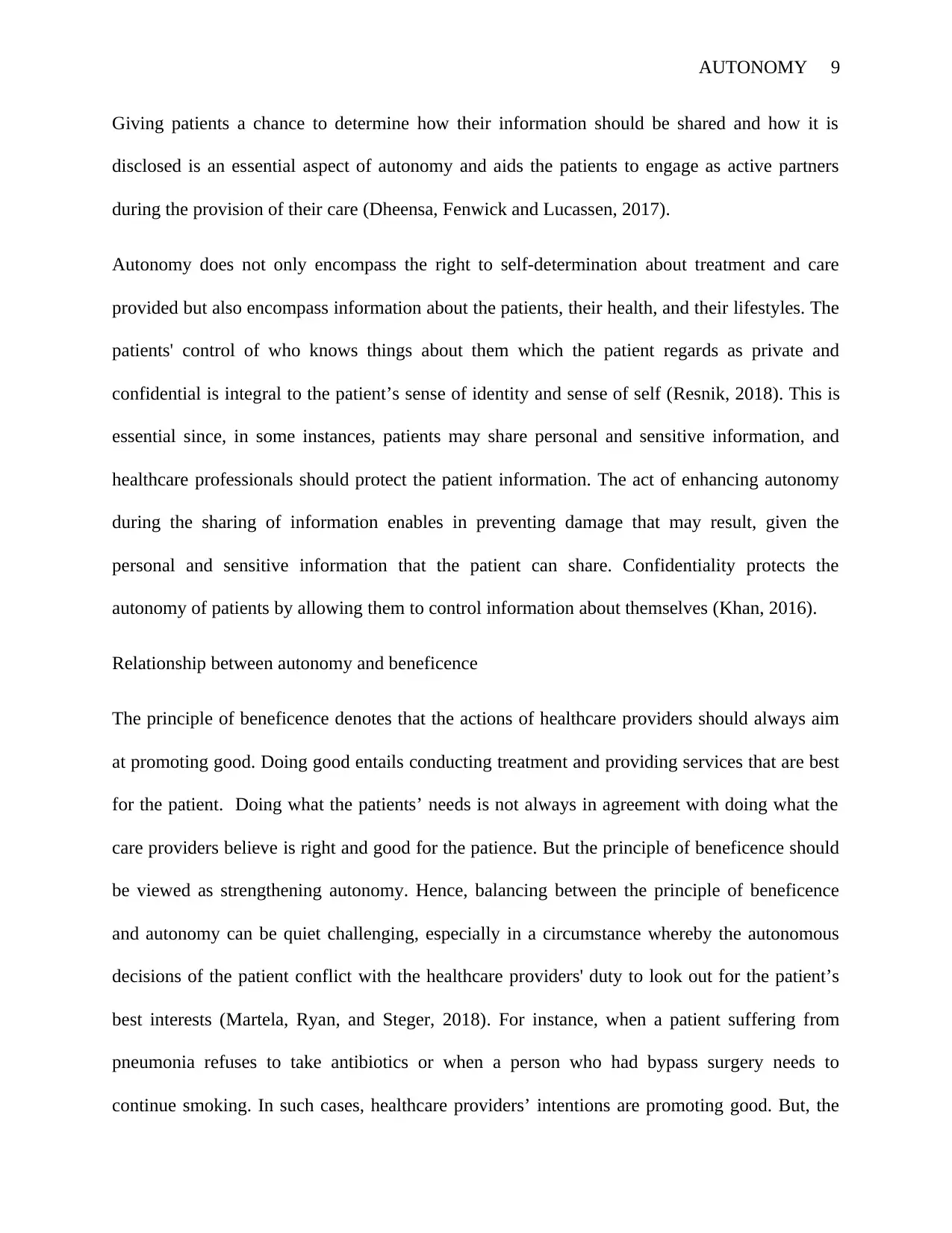
AUTONOMY 9
Giving patients a chance to determine how their information should be shared and how it is
disclosed is an essential aspect of autonomy and aids the patients to engage as active partners
during the provision of their care (Dheensa, Fenwick and Lucassen, 2017).
Autonomy does not only encompass the right to self-determination about treatment and care
provided but also encompass information about the patients, their health, and their lifestyles. The
patients' control of who knows things about them which the patient regards as private and
confidential is integral to the patient’s sense of identity and sense of self (Resnik, 2018). This is
essential since, in some instances, patients may share personal and sensitive information, and
healthcare professionals should protect the patient information. The act of enhancing autonomy
during the sharing of information enables in preventing damage that may result, given the
personal and sensitive information that the patient can share. Confidentiality protects the
autonomy of patients by allowing them to control information about themselves (Khan, 2016).
Relationship between autonomy and beneficence
The principle of beneficence denotes that the actions of healthcare providers should always aim
at promoting good. Doing good entails conducting treatment and providing services that are best
for the patient. Doing what the patients’ needs is not always in agreement with doing what the
care providers believe is right and good for the patience. But the principle of beneficence should
be viewed as strengthening autonomy. Hence, balancing between the principle of beneficence
and autonomy can be quiet challenging, especially in a circumstance whereby the autonomous
decisions of the patient conflict with the healthcare providers' duty to look out for the patient’s
best interests (Martela, Ryan, and Steger, 2018). For instance, when a patient suffering from
pneumonia refuses to take antibiotics or when a person who had bypass surgery needs to
continue smoking. In such cases, healthcare providers’ intentions are promoting good. But, the
Giving patients a chance to determine how their information should be shared and how it is
disclosed is an essential aspect of autonomy and aids the patients to engage as active partners
during the provision of their care (Dheensa, Fenwick and Lucassen, 2017).
Autonomy does not only encompass the right to self-determination about treatment and care
provided but also encompass information about the patients, their health, and their lifestyles. The
patients' control of who knows things about them which the patient regards as private and
confidential is integral to the patient’s sense of identity and sense of self (Resnik, 2018). This is
essential since, in some instances, patients may share personal and sensitive information, and
healthcare professionals should protect the patient information. The act of enhancing autonomy
during the sharing of information enables in preventing damage that may result, given the
personal and sensitive information that the patient can share. Confidentiality protects the
autonomy of patients by allowing them to control information about themselves (Khan, 2016).
Relationship between autonomy and beneficence
The principle of beneficence denotes that the actions of healthcare providers should always aim
at promoting good. Doing good entails conducting treatment and providing services that are best
for the patient. Doing what the patients’ needs is not always in agreement with doing what the
care providers believe is right and good for the patience. But the principle of beneficence should
be viewed as strengthening autonomy. Hence, balancing between the principle of beneficence
and autonomy can be quiet challenging, especially in a circumstance whereby the autonomous
decisions of the patient conflict with the healthcare providers' duty to look out for the patient’s
best interests (Martela, Ryan, and Steger, 2018). For instance, when a patient suffering from
pneumonia refuses to take antibiotics or when a person who had bypass surgery needs to
continue smoking. In such cases, healthcare providers’ intentions are promoting good. But, the
⊘ This is a preview!⊘
Do you want full access?
Subscribe today to unlock all pages.

Trusted by 1+ million students worldwide
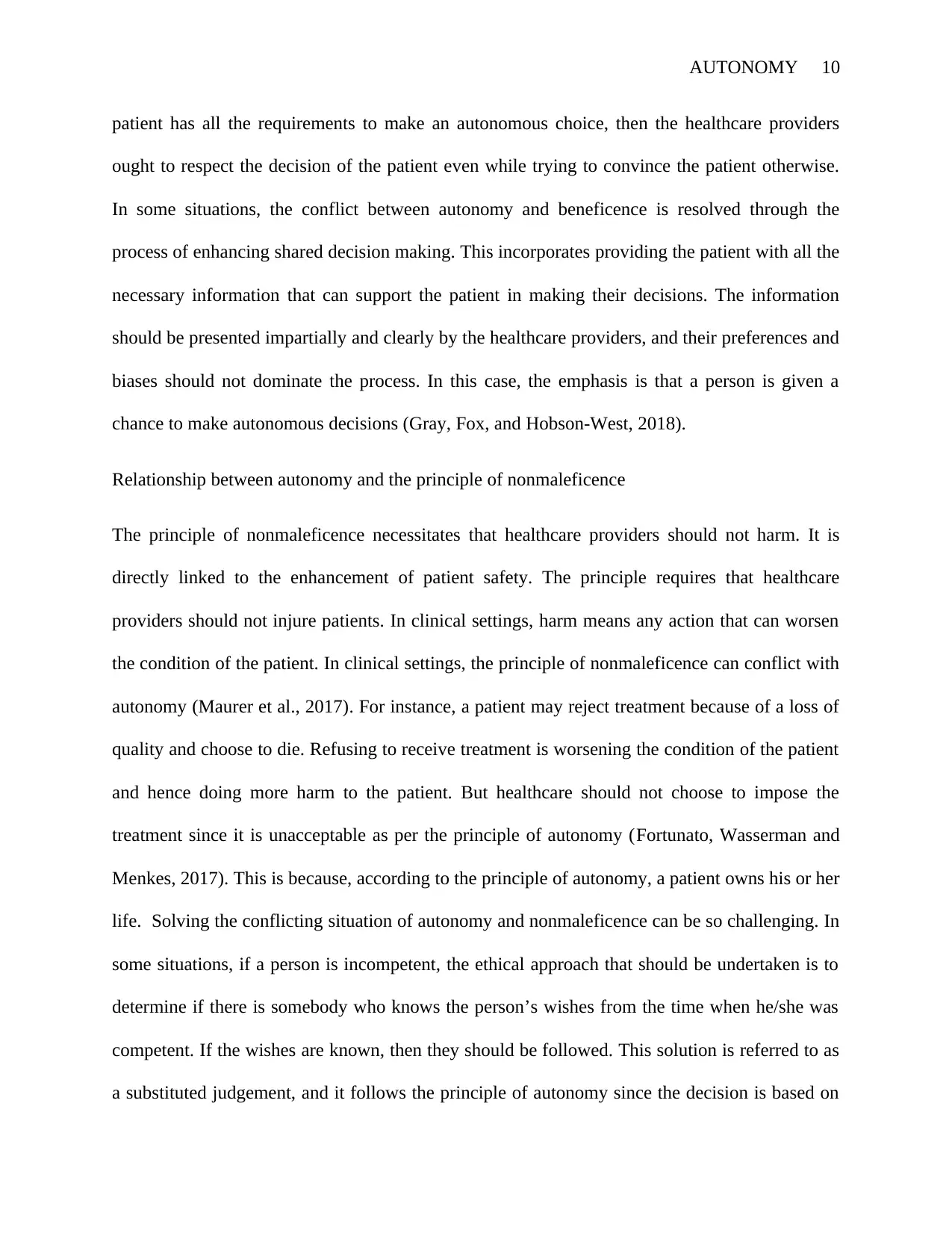
AUTONOMY 10
patient has all the requirements to make an autonomous choice, then the healthcare providers
ought to respect the decision of the patient even while trying to convince the patient otherwise.
In some situations, the conflict between autonomy and beneficence is resolved through the
process of enhancing shared decision making. This incorporates providing the patient with all the
necessary information that can support the patient in making their decisions. The information
should be presented impartially and clearly by the healthcare providers, and their preferences and
biases should not dominate the process. In this case, the emphasis is that a person is given a
chance to make autonomous decisions (Gray, Fox, and Hobson-West, 2018).
Relationship between autonomy and the principle of nonmaleficence
The principle of nonmaleficence necessitates that healthcare providers should not harm. It is
directly linked to the enhancement of patient safety. The principle requires that healthcare
providers should not injure patients. In clinical settings, harm means any action that can worsen
the condition of the patient. In clinical settings, the principle of nonmaleficence can conflict with
autonomy (Maurer et al., 2017). For instance, a patient may reject treatment because of a loss of
quality and choose to die. Refusing to receive treatment is worsening the condition of the patient
and hence doing more harm to the patient. But healthcare should not choose to impose the
treatment since it is unacceptable as per the principle of autonomy (Fortunato, Wasserman and
Menkes, 2017). This is because, according to the principle of autonomy, a patient owns his or her
life. Solving the conflicting situation of autonomy and nonmaleficence can be so challenging. In
some situations, if a person is incompetent, the ethical approach that should be undertaken is to
determine if there is somebody who knows the person’s wishes from the time when he/she was
competent. If the wishes are known, then they should be followed. This solution is referred to as
a substituted judgement, and it follows the principle of autonomy since the decision is based on
patient has all the requirements to make an autonomous choice, then the healthcare providers
ought to respect the decision of the patient even while trying to convince the patient otherwise.
In some situations, the conflict between autonomy and beneficence is resolved through the
process of enhancing shared decision making. This incorporates providing the patient with all the
necessary information that can support the patient in making their decisions. The information
should be presented impartially and clearly by the healthcare providers, and their preferences and
biases should not dominate the process. In this case, the emphasis is that a person is given a
chance to make autonomous decisions (Gray, Fox, and Hobson-West, 2018).
Relationship between autonomy and the principle of nonmaleficence
The principle of nonmaleficence necessitates that healthcare providers should not harm. It is
directly linked to the enhancement of patient safety. The principle requires that healthcare
providers should not injure patients. In clinical settings, harm means any action that can worsen
the condition of the patient. In clinical settings, the principle of nonmaleficence can conflict with
autonomy (Maurer et al., 2017). For instance, a patient may reject treatment because of a loss of
quality and choose to die. Refusing to receive treatment is worsening the condition of the patient
and hence doing more harm to the patient. But healthcare should not choose to impose the
treatment since it is unacceptable as per the principle of autonomy (Fortunato, Wasserman and
Menkes, 2017). This is because, according to the principle of autonomy, a patient owns his or her
life. Solving the conflicting situation of autonomy and nonmaleficence can be so challenging. In
some situations, if a person is incompetent, the ethical approach that should be undertaken is to
determine if there is somebody who knows the person’s wishes from the time when he/she was
competent. If the wishes are known, then they should be followed. This solution is referred to as
a substituted judgement, and it follows the principle of autonomy since the decision is based on
Paraphrase This Document
Need a fresh take? Get an instant paraphrase of this document with our AI Paraphraser
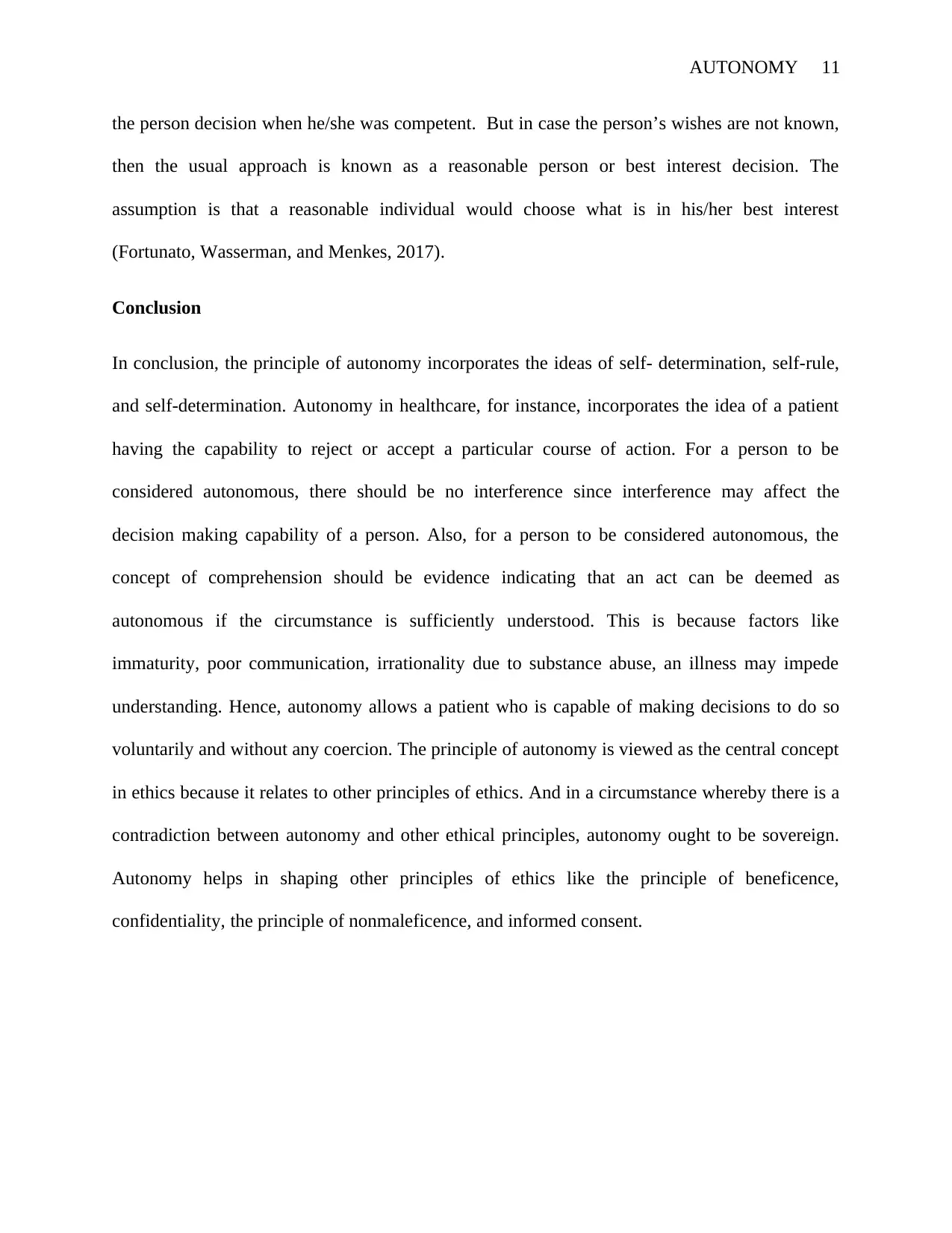
AUTONOMY 11
the person decision when he/she was competent. But in case the person’s wishes are not known,
then the usual approach is known as a reasonable person or best interest decision. The
assumption is that a reasonable individual would choose what is in his/her best interest
(Fortunato, Wasserman, and Menkes, 2017).
Conclusion
In conclusion, the principle of autonomy incorporates the ideas of self- determination, self-rule,
and self-determination. Autonomy in healthcare, for instance, incorporates the idea of a patient
having the capability to reject or accept a particular course of action. For a person to be
considered autonomous, there should be no interference since interference may affect the
decision making capability of a person. Also, for a person to be considered autonomous, the
concept of comprehension should be evidence indicating that an act can be deemed as
autonomous if the circumstance is sufficiently understood. This is because factors like
immaturity, poor communication, irrationality due to substance abuse, an illness may impede
understanding. Hence, autonomy allows a patient who is capable of making decisions to do so
voluntarily and without any coercion. The principle of autonomy is viewed as the central concept
in ethics because it relates to other principles of ethics. And in a circumstance whereby there is a
contradiction between autonomy and other ethical principles, autonomy ought to be sovereign.
Autonomy helps in shaping other principles of ethics like the principle of beneficence,
confidentiality, the principle of nonmaleficence, and informed consent.
the person decision when he/she was competent. But in case the person’s wishes are not known,
then the usual approach is known as a reasonable person or best interest decision. The
assumption is that a reasonable individual would choose what is in his/her best interest
(Fortunato, Wasserman, and Menkes, 2017).
Conclusion
In conclusion, the principle of autonomy incorporates the ideas of self- determination, self-rule,
and self-determination. Autonomy in healthcare, for instance, incorporates the idea of a patient
having the capability to reject or accept a particular course of action. For a person to be
considered autonomous, there should be no interference since interference may affect the
decision making capability of a person. Also, for a person to be considered autonomous, the
concept of comprehension should be evidence indicating that an act can be deemed as
autonomous if the circumstance is sufficiently understood. This is because factors like
immaturity, poor communication, irrationality due to substance abuse, an illness may impede
understanding. Hence, autonomy allows a patient who is capable of making decisions to do so
voluntarily and without any coercion. The principle of autonomy is viewed as the central concept
in ethics because it relates to other principles of ethics. And in a circumstance whereby there is a
contradiction between autonomy and other ethical principles, autonomy ought to be sovereign.
Autonomy helps in shaping other principles of ethics like the principle of beneficence,
confidentiality, the principle of nonmaleficence, and informed consent.
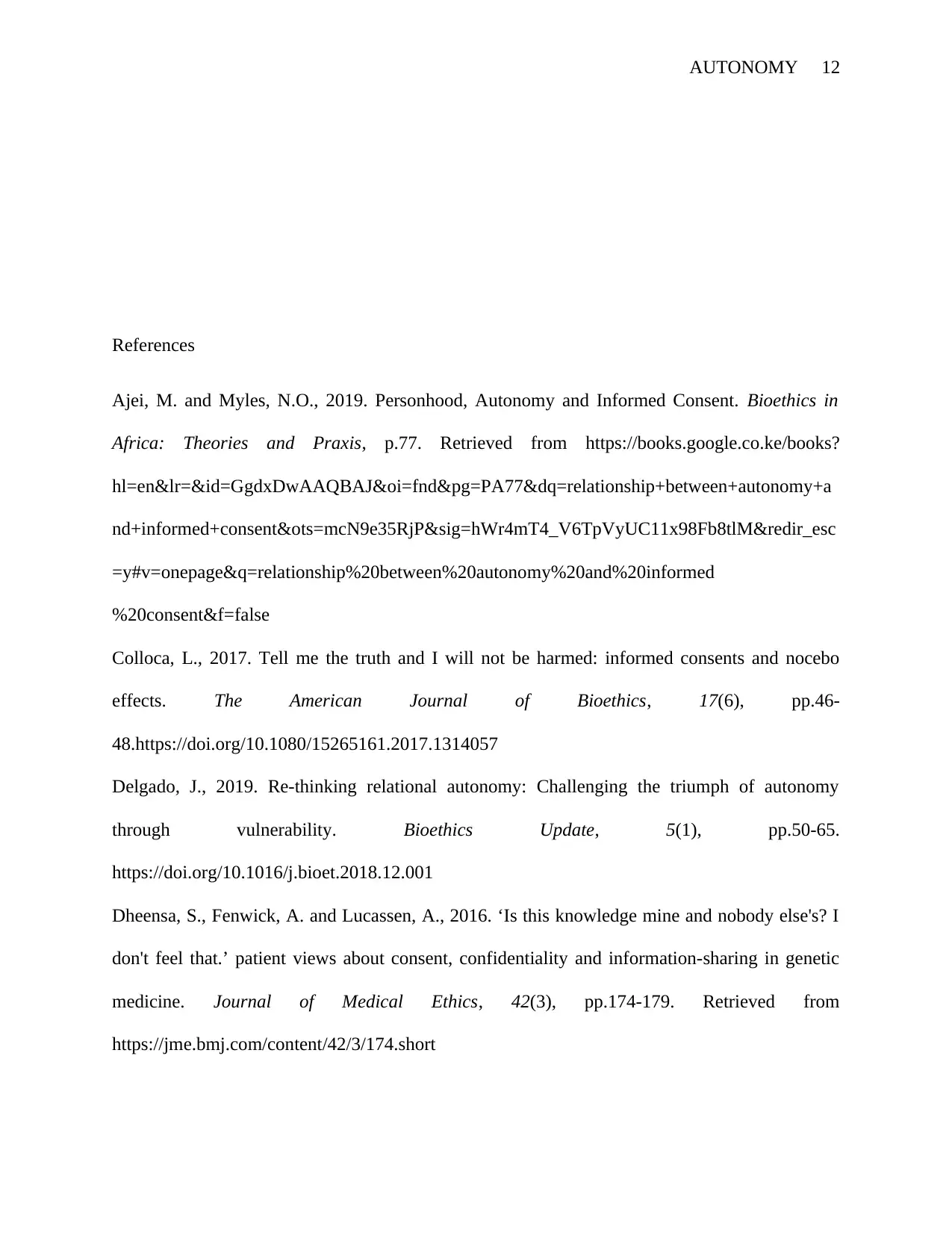
AUTONOMY 12
References
Ajei, M. and Myles, N.O., 2019. Personhood, Autonomy and Informed Consent. Bioethics in
Africa: Theories and Praxis, p.77. Retrieved from https://books.google.co.ke/books?
hl=en&lr=&id=GgdxDwAAQBAJ&oi=fnd&pg=PA77&dq=relationship+between+autonomy+a
nd+informed+consent&ots=mcN9e35RjP&sig=hWr4mT4_V6TpVyUC11x98Fb8tlM&redir_esc
=y#v=onepage&q=relationship%20between%20autonomy%20and%20informed
%20consent&f=false
Colloca, L., 2017. Tell me the truth and I will not be harmed: informed consents and nocebo
effects. The American Journal of Bioethics, 17(6), pp.46-
48.https://doi.org/10.1080/15265161.2017.1314057
Delgado, J., 2019. Re-thinking relational autonomy: Challenging the triumph of autonomy
through vulnerability. Bioethics Update, 5(1), pp.50-65.
https://doi.org/10.1016/j.bioet.2018.12.001
Dheensa, S., Fenwick, A. and Lucassen, A., 2016. ‘Is this knowledge mine and nobody else's? I
don't feel that.’ patient views about consent, confidentiality and information-sharing in genetic
medicine. Journal of Medical Ethics, 42(3), pp.174-179. Retrieved from
https://jme.bmj.com/content/42/3/174.short
References
Ajei, M. and Myles, N.O., 2019. Personhood, Autonomy and Informed Consent. Bioethics in
Africa: Theories and Praxis, p.77. Retrieved from https://books.google.co.ke/books?
hl=en&lr=&id=GgdxDwAAQBAJ&oi=fnd&pg=PA77&dq=relationship+between+autonomy+a
nd+informed+consent&ots=mcN9e35RjP&sig=hWr4mT4_V6TpVyUC11x98Fb8tlM&redir_esc
=y#v=onepage&q=relationship%20between%20autonomy%20and%20informed
%20consent&f=false
Colloca, L., 2017. Tell me the truth and I will not be harmed: informed consents and nocebo
effects. The American Journal of Bioethics, 17(6), pp.46-
48.https://doi.org/10.1080/15265161.2017.1314057
Delgado, J., 2019. Re-thinking relational autonomy: Challenging the triumph of autonomy
through vulnerability. Bioethics Update, 5(1), pp.50-65.
https://doi.org/10.1016/j.bioet.2018.12.001
Dheensa, S., Fenwick, A. and Lucassen, A., 2016. ‘Is this knowledge mine and nobody else's? I
don't feel that.’ patient views about consent, confidentiality and information-sharing in genetic
medicine. Journal of Medical Ethics, 42(3), pp.174-179. Retrieved from
https://jme.bmj.com/content/42/3/174.short
⊘ This is a preview!⊘
Do you want full access?
Subscribe today to unlock all pages.

Trusted by 1+ million students worldwide
1 out of 16
Related Documents
Your All-in-One AI-Powered Toolkit for Academic Success.
+13062052269
info@desklib.com
Available 24*7 on WhatsApp / Email
![[object Object]](/_next/static/media/star-bottom.7253800d.svg)
Unlock your academic potential
Copyright © 2020–2026 A2Z Services. All Rights Reserved. Developed and managed by ZUCOL.




